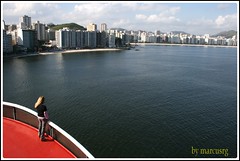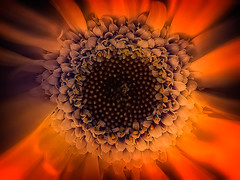 THE GLOBAL GOURMET: Sian Powell meets Thailand's answer to Gordon Ramsay, celebrity chef McDang August 08, 2009
THE GLOBAL GOURMET: Sian Powell meets Thailand's answer to Gordon Ramsay, celebrity chef McDang August 08, 2009Article from: The Australian
"WHAT is this black stuff, this black sauce?" exclaims the celebrity chef and minor Thai royal known as Chef McDang.
He is talking about the increasingly frequent use of Chinese oyster sauce in Thai restaurants, and waving his hands in frustration. "This is not Thai. Nobody knows the roots of Thai food, nobody cares about the history of Thai food, nobody has pride in the culture of Thai food.
 Image by *~M16_Qtr~*back to QTR via Flickr
Image by *~M16_Qtr~*back to QTR via Flickr
"No one cares, they just want to make money."
Chef McDang is a household name in Bangkok; he's the Thai equivalent of Britain's Gordon Ramsay (but far more courteous) or Australia's Neil Perry. With four Thai-language recipe books and two Thai-language restaurant guides to his name, a weekly television program, and a weekly newspaper column, McDang is a culinary force majeure. Now, as well as his other commitments, he is writing and compiling his magnum opus: an English-language compendium to be called ThePrinciples of Thai Cookery.
McDang is a complicated moniker: a combination of his father's nickname Muck, meaning squid or ink, added to his mother's nickname, Dang, meaning red. McDang's real name is M.L. Sirichalerm Svasti, or Siri to his friends. M.L. is the prefix denoting his standing in the royal family.
Chef McDang is a household name in Bangkok; he's the Thai equivalent of Britain's Gordon Ramsay (but far more courteous) or Australia's Neil Perry. With four Thai-language recipe books and two Thai-language restaurant guides to his name, a weekly television program, and a weekly newspaper column, McDang is a culinary force majeure. Now, as well as his other commitments, he is writing and compiling his magnum opus: an English-language compendium to be called ThePrinciples of Thai Cookery.
McDang is a complicated moniker: a combination of his father's nickname Muck, meaning squid or ink, added to his mother's nickname, Dang, meaning red. McDang's real name is M.L. Sirichalerm Svasti, or Siri to his friends. M.L. is the prefix denoting his standing in the royal family.
McDang was born in 1953 and raised in the Sukhothai Palace in Bangkok, now the home of Thailand's Crown Prince Maha Vajiralongkorn. When McDang was a child he lived in utmost luxury with his great-aunt, the dowager queen of Thailand, Queen Ramphaiphanni (who coined his nickname). Revered as near deities, Thai royals were not expected to peel or pit their own fruit, or even to debone their fish; it was all done for them.
 Image by J.Gil via Flickr
Image by J.Gil via Flickr
"Lunches lasted for 2 1/2 hours. So did dinners. The food was amazing, I used to sneak into the lower kitchen," he remembers. Then, the shock. He went to Britain to be educated, to Cheltenham College boarding school. There he was introduced to blancmanges, overdone roast beef and soggy Yorkshire pudding. He grimaces. "The food was terrible in Britain; there was nothing toeat."
Still, he wound up speaking English and French with remarkable fluency. At one stage, he thinks, his French was better than his Thai. So how does a boy who grew up eating exquisite food, prepared for royals, then choking down English boarding-school fare, learn tocook?
McDang's father is a renowned gourmand in Thailand and hosts a popular daily radio program. So it may not be so strange that McDang wound up working as a professional cook, hosting a TV food show and writing Thai cookery books: he was following in his father's footsteps. His parents wanted him to become a diplomat, but he abandoned the study of international relations for a course at the Culinary Institute of America. Still, McDang points out that cooking is not really regarded as a proper profession in Thailand, not like law, medicine or even engineering.
"Who the hell would want to work in a kitchen?" McDang asks. "It is so hot, you're under so much pressure. I had my restaurant in the US for 20 years. That was enough."
He sold his Back Porch Cafe in Delaware a long time ago but he spent nearly three decades away from Thailand. Now every year he leaves Bangkok to go to the US to teach and lecture on the principles of Thai cuisine at a handful of cooking schools and culinary institutes.
He has had fun introducing Americans to "the more exotic elements" of Thai cuisine: he recently served the mayor of Los Angeles cubed yellow and red watermelon liberally frosted with a mixture of fish flakes, shallots and garlic. He proffers me this frosting for a taste: it is delicious.
Sitting in his extraordinary duplex apartment beside Bangkok's Chao Phraya river, with a panoramic view of the waterway, McDang gets passionate about his self-published English-language compendium of Thai cookery. He says he has to make a mark with it in English first, to earn the respect of Thais. Even though Thai food, flavoursome and easily digested, has swept the world, with thousands of Thai restaurants and takeaways across Australia and green curry and pad thai now featuring heavily in Western diets, McDang says, "Thai people are still strangely ignorant about their own food heritage."
He adds, "We don't even know our cuisine very well. We don't have a dictionary of Thai cuisine. We don't have anybody who is Thai who writes about Thai food (internationally). There are pretty cookbooks done by farangs (foreigners)," he says.
Australian restaurateur David Thompson, once famed in Sydney for his Darley Street Thai restaurant, is one of these farangs. Now based in London, where he runs the Michelin-starred Thai restaurant Nahm, Thompson's comprehensive book Thai Food was published in 2004. "It was a service to Thai cuisine," McDang says.
But, he adds, foreign writers often make basic mistakes about Thai food. McDang wants his The Principles of Thai Cookery to provide a structure, a framework for Thai food, to formalise the grammar of a cuisine in much the same way that Escoffier or Larousse formalised French cuisine.
"I'm well known in Thailand, but I want people to take me seriously. I want them to look up to me for knowledge. But it won't happen unless I am accepted by the rest of the world. This book is my ticket to coming back to Thailand; to help my country take pride in its own cuisine and its own food culture," he says.
 Image by marcusrg via Flickr
Image by marcusrg via Flickr
McDang estimates the self-publishing project will cost him about 5million Thai baht ($180,000). The photographs have been taken and the book will have 15 chapters: the first five on the history and culture of Thai food, and the remaining 10 featuring recipes and explanations. He expects to launch it in the US this year.
It will set out the rules of Thai cuisine and explain why certain ingredients and practices are acceptable and others are not, such as granulated sugar, which he says too many Thai restaurants use. The more difficult-to-use palm sugar is the appropriate sweetener. Oil on a salad is out; sesame oil on a Thai salad infuriates him. "Thai salads have no fat."
At first encounter, McDang seems something of a rebel. There are shocks of peroxide white in his hair, he is wearing a T-shirt and a pair of flowered shorts, and expletives pepper his speech.
 Image by Reinante El Pintor de Fuego via Flickr
Image by Reinante El Pintor de Fuego via Flickr
"This is what makes Thailand," he says, "an appreciation and a fundamental understanding of the national cuisine. You just have to taste what our food is like and you know what our culture is like."
http://www.chefmcdang.com/
Sian Powell is a freelance writer living in Bangkok.

No comments:
Post a Comment